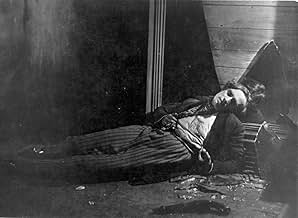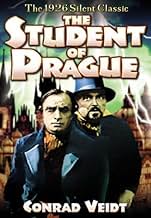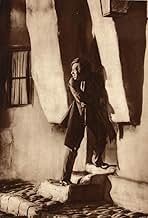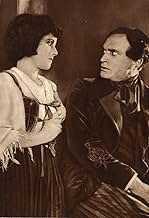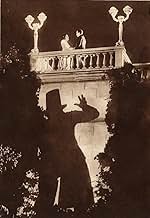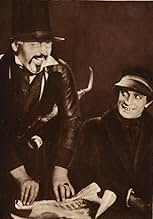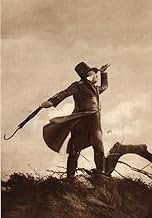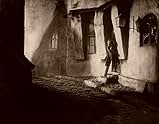Añade un argumento en tu idiomaFor Balduin, going out to beer parties with his fellow students and fighting out disputes at the tip of the sword have lost their charms. He wants to find love; but how would he, a penniless... Leer todoFor Balduin, going out to beer parties with his fellow students and fighting out disputes at the tip of the sword have lost their charms. He wants to find love; but how would he, a penniless student, ever dare looking up to any woman worth of loving? Absorbed in his dreary though... Leer todoFor Balduin, going out to beer parties with his fellow students and fighting out disputes at the tip of the sword have lost their charms. He wants to find love; but how would he, a penniless student, ever dare looking up to any woman worth of loving? Absorbed in his dreary thoughts and indifferent to the advances of Lyduschka, Balduin is unexpectedly offered a fortune... Leer todo
- Dirección
- Guión
- Reparto principal
- Liduschka, Blumenmädchen
- (as Elizza la Porta)
- Comtesse Margit, seine Tochter
- (as Agnes Esterhazy)
Reseñas destacadas
Obviously, close-ups and medium shots were common by 1926, where there were none in the aforementioned film of 1913. There's scene dissection, some inspired cinematography and editing and expressionistic sets by Hermann Warm, as well. We actually get to see the actors here, and Conrad Veidt and Werner Krauss do exceptionally well. The gypsy storyline fits into this version easily.
Cinematographers Günther Krampf and Erich Nitzschmann produced a large shadow of the Devil, which interacts with mass, in one shot; superimpose a saw cutting at Balduin's head in a moment of internal narration; shake the camera for a drunk POV shot; use irises and move the camera during close-ups. The rescue from a horse scene and the haunting finale are the most impressive visually, for the chiaroscuro lighting, special effects and editing. Some shots even seem intentionally reminiscent of the 1913 version. Additionally, the filmmakers were able to punctuate the mirror motif within this film of the doppelgänger thanks to state-of-the-art effects.
A mephistophelian character named Scarpinetti offers to deliver on that, and in one scene dramatically stands atop a windy hill by a fallen tree gesturing towards a hunting party. They seem to follow his directions, which leads to a rich heiress having trouble with her horse near Balduin, who rescues her.
However, this is just a tease from Scarpinetti. Balduin goes to visit the woman later, taking with him a flower from a poor flower girl (who seems sweet on him). He fidgets with the flower behind his back, and seems to be contemplating giving it to the rich woman, when her fiancé's large flower arrangement arrives. Balduin realizes he needs money to woo this woman (forgetting, seemingly, that he'd wanted a rich woman for money in the first place anyway).
He makes a deal with Scarpinetti: 600,000 pieces of gold (! - error in the intertitle, maybe?) and Scarpinetti gets to take anything he wishes from Balduin's room. He manages to take Balduin's mirror reflection, and while that would seem to be the end of the deal, Scarpinetti still influences events in Balduin's life.
There are some striking scenes in the movie, and some scenes that really drag. One that goes on for a long time is a party after someone had died, and there doesn't seem to be much purpose to it, or at least for it to have been so long.
Balduin's mirror reflection doppelganger doesn't show up much, but figures in more towards the end, which is pretty satisfactory. I'm curious to see the other adaptations of this story now as well.
The plot is a combination of FAUST and Poe's WILLIAM WILSON. Conrad Veidt plays Baldwin, a poor student who falls in love with an upper class girl but doesn't have the money to woo her. He makes a deal with the Devil for wealth but at an unexpected cost. Satan takes Baldwin's mirror reflection as payment. The doppelganger does bad things that the student is blamed for. This leads to a final confrontation. The Devil is played by Veidt's CABINET OF DR CALIGARI co-star Werner Krauss. His appearances are brief, but unforgettable. Elizza La Porta portrays the flower girl whom Baldwin rejects. Director Henrik Galeen, who wrote two other German supernatural classics, NOSFERATU and THE GOLEM, shows that he was just as capable behind the camera.
Like most important films from the Weimar Era, STUDENT is divided into acts as if it were a stage play. There are 7 acts of which two, Acts 3 and 6, linger in the memory long after the movie ends. In Act 3 Baldwin makes his deal with the Devil. The endless stream of money coming from a small coin purse until it overflows the table followed by Baldwin's reflection walking out of the mirror as he stands motionless, is mesmerizing. Act 6 takes place in a tavern where Baldwin has gone after being abandoned by his his friends. He buys drinks for everyone, and they start dancing. Slowly at first, then things get wilder and more diabolical as Baldwin comes to realize that his life is no longer his own and he has no control over what will happen to him next. The tavern scene is my favorite in the movie.
This restoration was done in 1999 and, while not perfect, at least gives us the opportunity to view the complete film in a pretty good condition. The source material was derived from two prints, one from Uruguay, the other from Moscow film archives. The print has been tinted but is oversaturated in places (which can be corrected by decreasing the color on your TV) and comes with a newly composed score from Stephen Horne which was done in 2016. The scoring of the Act 6 party scene is one of the most effective I have ever heard. Although the DVD comes from Germany, it's an all-Region release which means it plays on Region One DVD players without any issues. Hopefully a fully restored Blu-ray edition, including Horne's music, will be ready for the film's 100th anniversary in 2026... For more reviews visit The Capsule Critic.
¿Sabías que...?
- CuriosidadesElizza La Porta's debut.
- Versiones alternativasVersion restored in 1999 for the Munich Film Archive based on a copy with Spanish intertitles from the Archivo Nacional de la Imagen y la Palabra - Sodre in Montevideo that was secured by L'Immagine Ritrovata, Bologna, and a German copy secured by Gosfilmofond, Moskow. The version has been re-tinted, with the tinting only partially matching that of the Spanish copy. Music by Stephen Horne, sound Orpheus Studio, London. Runtime 2 hours 13 minutes.
- ConexionesEdited into Histoire(s) du cinéma: Le contrôle de l'univers (1999)
Selecciones populares
- How long is The Student of Prague?Con tecnología de Alexa
Detalles
- Duración
- 1h 50min(110 min)
- Mezcla de sonido
- Relación de aspecto
- 1.33 : 1

